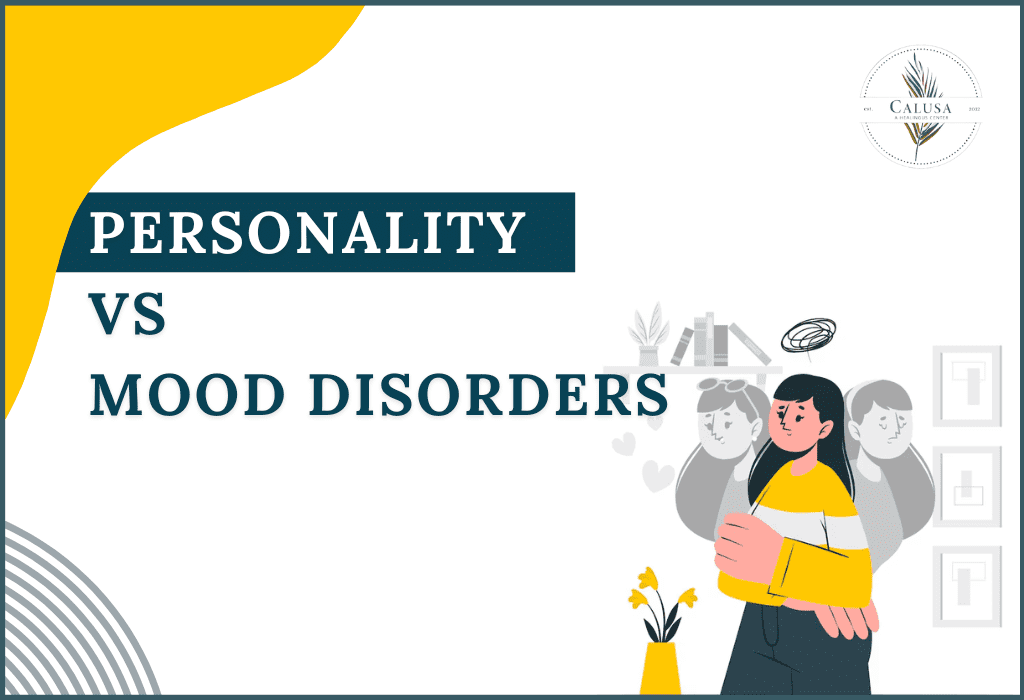Understanding mental health is crucial, especially when navigating complex conditions like personality vs mood disorders. While these terms might seem similar, they represent two very different challenges. Recognizing the distinctions is the first step toward seeking appropriate help.
Calusa Recovery explains that the journey is overwhelming, as we have seen many individuals work hard to get here. This is the reason we offer compassionate care focused on each patient’s individual needs. There is balance and control. Our team will help you regain both, whether it’s through recognizing the indicators or providing practices that have shown results in research.
So, before venturing forward to seek treatment, let’s first look at the personality vs mood disorders distinction so that people are able to improve the way they see mental illness.
What Are Personality and Mood Disorders?
Both personality and mood disorders are considered to be parts of a mental disorder, but they tend to address different areas. In the case of personality disorders, their roots lie deep within an individual’s behavior and thinking in such a manner that they have amisation in which interpersonal and social interactions are highly disturbed. In nature, mood disorders focus on emotional variations that meet routine interference.
Approximately 9.1% of the U.S. adult population has a personality disorder. Self-education on these fundamental perspectives will make it easier to assess what one or a person around one might be feeling.
Find the Support You Need for a Better Tomorrow!
Key Points to Remember
- Personality disorders derive themselves through development regarding ways in which an individual behaves and relates with others.
- A person suffering from mood disorders oscillates from extreme emotional highs to severe emotional lows.
Educating oneself regarding the details of these conditions can be the Holy Grail for improving individuals’ mental health.
The Main Differences Between Personality and Mood Disorders
In spite of sharing some common features, personality vs mood disorders regarding their manifestations and etiology. Let’s delve into these differences.
Personality Disorders
Disorders of the personality modify the way in which a person engages with other people and the world in general. These patterns are often entrenched during early adolescence or early adulthood.
Common Traits:
- Affective disturbance with regards to attachment, bonding, or affinity/affection towards most of the relatives.
- Tendency to overreact emotionally or be very sensitive.
- Rigidity in holding bias and stubbornness in their ideas and opinions.
Examples of Personality Disorders:
- Borderline Personality Disorder (BPD).
- Narcissistic Personality Disorder (NPD).
Even though such behaviors may be otogenic, they are alterable, thus making progress possible with the necessary accompaniment and support.
Mood Disorders
Mood Disorders are seen as chronic deceptions in molecular and cellular emotion impairment through the voluntary and involuntary flow of energy and strength alteration towards each cell. Their changes could last for weeks, months, or even years. Mood disorders, including major depression and bipolar disorder, affect nearly 21 million U.S. adults annually, making them some of the most common mental health conditions.
Common Traits:
- In many cases, man would experience prolonged imprinting of shyness, sterner impressions, or augmented energy.
- Harsh changes but too into wide bandwidths.
- Exhaustion, anxiety, apathy, or hypoactive fatigue encompass this disorder.
Examples of Mood Disorders
- Depression.
- Bipolar Disorder.
When present, however, the advances have a profound and radical impact on managing the vicious cycle of these conditions.
Symptoms of Personality and Mood Disorders
Understanding the differences between personality vs mood disorders may assist in timely diagnosis and treatment. Now, let us outline the signs characteristic of each.
Personality Disorder Symptoms
It is common for people suffering from a personality disorder to have a tendency to engage in unhealthy relationships repeatedly.
Symptoms include
- There is chronic interpersonal conflict.
- There are struggles with polarization, perceiving situations as all being good or completely bad.
- Other’s emotions are difficult to recognize.
Although such behaviors may be seen as unchangeable, therapy can teach individuals to develop and optimize their people skills.
Mood Disorder Symptoms
Change for the better, be it in a particular direction or constant oscillation, is the characteristic of an emotional upsurge that is termed mood disorder. It is a disorder that can affect all facets of one’s daily existence. Mood disorders are a leading cause of disability worldwide, with depression ranked as the single largest contributor to global disability.
The following symptoms may be experienced:
- Chronic feelings of despair or worthlessness.
- There is sudden and uncaused feeling or physical energy.
- There is trouble in focusing on mundane tasks or resolving dilemmas.
These symptoms signify that it is time to start making strides toward recovery by seeking help to stabilize within one’s self.
How Are Personality and Mood Disorders Treated?
With the right practice, both personality and mood disorders can be controlled. Proper professional communication can work wonders.
Treatment for Personality Disorders
The emphasis of all therapies is to treat anxiety and mood in order to redesign automatic thoughts.
Such options include:
- Cognitive Behavioral Therapy (CBT).
- Dialectical Behavior Therapy (DBT).
- Symptom-targeted medication.
Such therapies expand the repertoire of behavioral skills and enhance the connectedness of the person.
Treatment for Mood Disorders
Therapy and medication in appropriate doses are essential for mood disorders since medications do not ‘burn bridges’ but help in the creation of one.
Such options include:
- Antidepressants and mood stabilizers, however, are often effective.
- Psychotherapy is most beneficial as it allows for the understanding of emotions.
- Regular exercise and practices such as meditation are other lifestyle changes advocated here.
There is always a better chance of recovery when the treatment is tailored to the particular patient.
Why Does Understanding the Difference Matter?
It is crucial for all people to understand the distinction between mood disorders vs personality disorders. This, in turn, preserves them from misdiagnosis, which can be a reason for never-ending struggles.
What You Can Do
- Contact an appropriate mental health therapist.
- Document the symptoms thoroughly and give them to the doctor.
- Understand the necessities in therapy that will work best for you and look for them.
Help comes from within. It is a tough and courageous step to take, but it is necessary to regain your life.
Your Journey to a Brighter Tomorrow
FAQs
Q: What is the difference between mental disorder and personality disorder?
A: Mental disorders are a general term for a multitude of mental illnesses related to mood, behavior, or the ability to think. A personality disorder pertains to the long-lasting and pervasive irrational patterns of behaviors and thoughts that disrupt interpersonal relationships and day-to-day functioning in society.
Q: Can you have a mood disorder and a personality disorder at the same time?
A: Indeed, one can be diagnosed with a mood disorder as well as a personality disorder at the same time. This is referred to as comorbidity, where more than one clinical syndrome exists at the same time. Without proper investigation and explanation, there will be no way to treat both disorders comprehensively and enhance the well-being of the individual.
Q: What are the four types of personality disorders?
A: Personality disorders can be classified into three clusters, but the frequently identified or observed types include borderline personality disorder, narcissistic personality disorder, antisocial personality disorder, and avoidant personality disorder. Each type has its own characteristic symptoms and obstacles, and therefore, each requires different therapeutic modalities in order to be treated effectively.
Q: What is the difference between personality traits and disorders?
A: There are the interpersonal and intrapersonal dimensions to personality, and they are, respectively, the traits of a person’s thoughts, action patterns, and emotions that others perceive as his or her personality individualism. Such disorders are experienced when these patterns become unable to change, are maladaptive to the individual, and have affected relationships or everyday functioning. Normal traits are variations and are the usual; disorders, on the other hand, are commonly transformed to exacerbate disruptions in life.
How Calusa Recovery Can Help
We at Calusa Recovery appreciate your talent and your courage to face personality vs. mood disorders. More importantly, our programs are all about everyone, one in which evidence-based treatment blends with compassion and creative minds.
We don’t just treat symptoms; we address the full person’s mentality, feelings, and body as a whole. Therapy, medication support, or starting a productive and healthy lifestyle – that’s all we do here: help you prosper.
Start Your Recovery Today
The importance of knowing the difference between personality vs mood disorders is essential when it comes to treatment and support. If it is you or a significant other who goes through difficulties with this, there are ways to overcome it.
Let Calusa Recovery guide you toward a better tomorrow. With expert care and compassionate support, we’re ready to help you take the next step toward healing and wellness.










